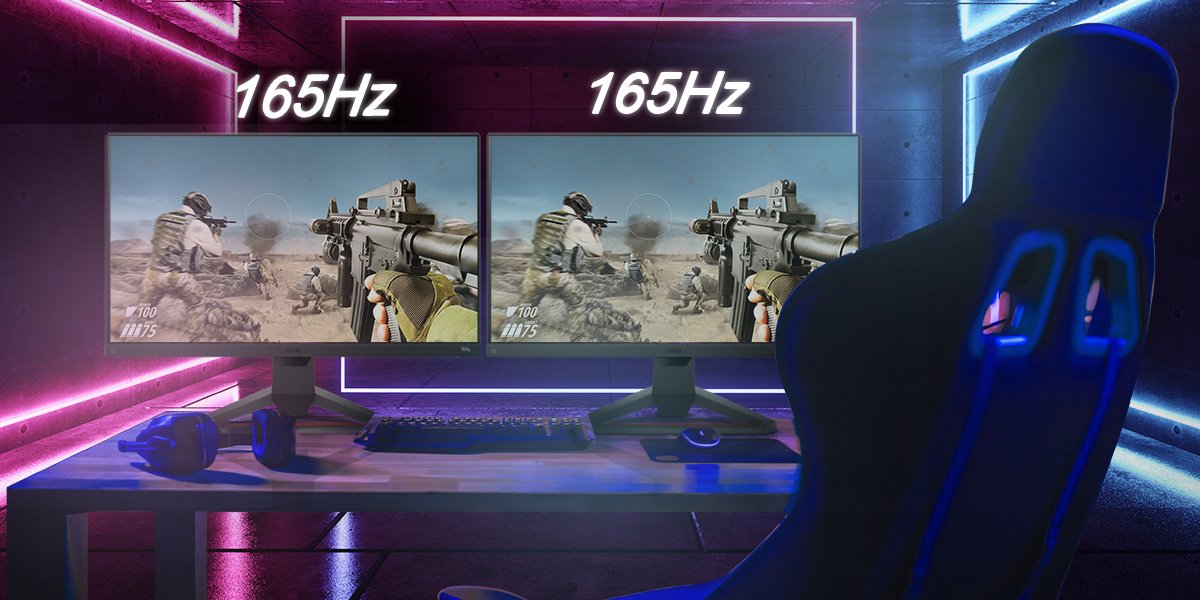


As 165Hz monitors continue to become more popular and mainstream, there’s a natural demand to have more than one. The expanded viewing area is attractive to many gamers and desktop users, especially those keen on multitasking. We’ve done a pretty extensive guide to hooking up two or more monitors with 144Hz in mind, and of course all the essentials are exactly the same for 165Hz monitors. So we won’t bore you by repeating everything. However, some things are worth noting, especially the slightly elevated GPU demand posed by 165Hz compared to 144Hz in a dual monitor set up.
Referring to the title of this article, the pros are clear. You get twice the display size for greater immersion, more impressive viewing, and vastly more effective multitasking and productivity. The cons are of course extra cable clutter, incompatibility with certain apps and games, higher demand on your graphics hardware, and occasionally desktop or OS image setting conflicts. Having said all that, Windows 10 and all other major operating systems these days have come a long way towards accommodating dual and even triple screen set ups, and you’re not going to run into too many problems.
Resolution: this one’s very important. There’s nothing stopping you from pairing a 1080p monitor with a 4K one, but you won’t be able to extend the display, and even duplicating will cause issues. Please stick with monitors of identical resolution, like two 165Hz 1080p gaming monitors.
Graphics card: while 165Hz in 1080p on a single screen is fine for most graphics cards released in the last few years, when you dual monitor you should prepare for a doubling of graphics load. Even with the best scaling, which supposedly “tricks” the GPU into thinking two screens are actually just one, the golden rule for absolute peace of mind is one GPU per screen. Since that’s not viable now with the effective phasing out of SLI and CrossFire, you need to have a reasonably powerful GPU for two 1080p monitors while expecting 165Hz. Those two monitors have a total resolution of 1920 x 2160 in extended mode, or 4.1 million pixels theoretically. That’s twice the pixel count of 1080p.
To drive those two monitors without issues you’ll need a capable graphics card providing an overhead, or a performance safety net. An RTX 3060 or RX 6700 will do, but if you can’t find those then an RTX 2070 or RX 580 should also be enough. In terms of VRAM, you want to be over 6GB, which should not be a problem.
Cables: as of this writing, we still can’t recommend HDMI for dual monitor set ups. While HDMI 2.1 does support daisy chaining, it’s not common yet nor as mature as the support DisplayPort provides for linking monitors. Connecting your desktop to the first monitor via DisplayPort 1.4 and that monitor to the second using DisplayPort 1.4 as well gives you ample bandwidth for 1080p 165Hz and 1440p 144Hz with nearly no latency incurred. VESA’s DisplayPort is by far the preferred standard when it comes to dual monitors, but we expect HDMI to improve a lot in the near future.
Since we assume you’ll have your dual monitors in a desktop environment, there’s no need to buy long DisplayPort cables. Anything longer than 1.5m isn’t necessary, and can only reduce signal fidelity, even if just a little.
The guide we did before has more info, but it’s really simple. Just a matter of connecting cables and then going into display settings in Windows and your graphics card driver to detect the displays and choose whether you want to extend or duplicate. For most people, extending is what’s needed. This is the way you get a massive viewing area for your gaming and desktop apps. Duplication is more for laptop users who want to view the desktop on a larger screen than the one provided with their mobile PC.
Once set up, your extended display offers a gigantic field of view in games and for desktop apps. Most people don’t notice the bezel in between the monitors after a while, and for the most part pairing two 1080p monitors is cheaper than buying a big 4K monitor, plus you get higher refresh rates with less GPU demand. Monitors with 4K 165Hz are basically unheard of in summer 2021, because GPUs that can sustain such performance in many games do not exist yet. Two MOBIUZ 25” 1080p 165Hz monitors offer nearly the same screen size as a 48” 4K monitor, but for about a third of the price and with just as many or even better gaming features, namely variable refresh, HDR, 1ms MPRT, and powerful audio. Remember, while great, those big 4K monitors are generally re-purposed TVs with slower VA panels or extra-expensive OLED. The bigger the screen, the slower the response and the more likely ghosting becomes. Two nimble 25” IPS monitors offer faster performance.
With regards to set up and cabling, there’s no difference. But curved monitors are rarely used in dual monitor mode because their design doesn’t support seamless placement side by side. If you do put two curved monitors next to each other, there’s going to be a “ridge” along the line of connection, and that may bother you. Flat monitors are ideal for dual screen usage, for curved monitors we suggest you go with a single, slightly bigger display.
The bottom line is that the 165Hz screen refresh rate doesn’t make a difference until you hit bandwidth limitations. If you stick with 1080p 165Hz, there’s no problem because DisplayPort can carry that kind of visual data effortlessly. When the time comes for pairing two 240Hz 4K monitors we’ll just have to write a new article!
{{title}}
We will notify you when we have more.
We will send you an email once the product become available.Your email will not be shared with anyone else.
Sorry, our store is currently down for maintenance.We should be back shortly. Thank you for your patience!